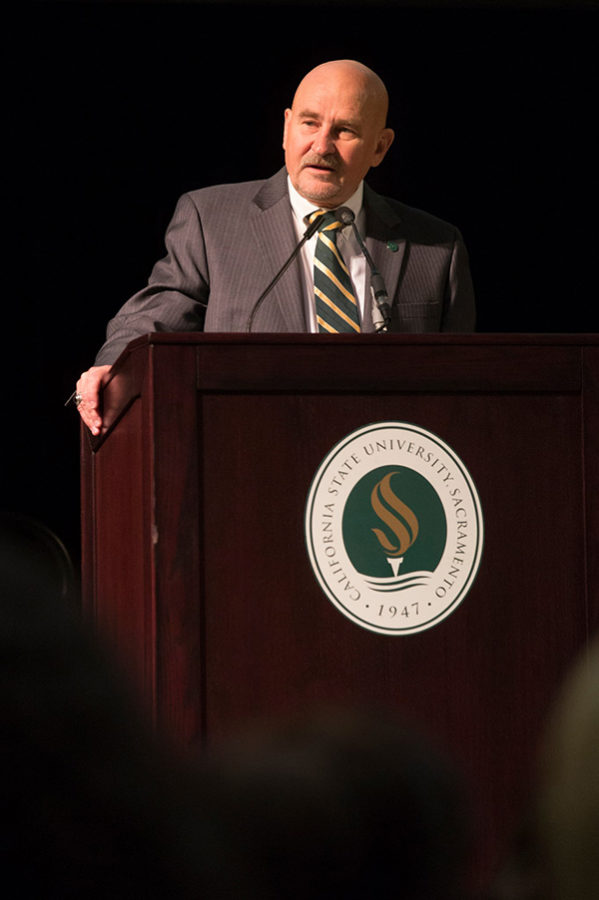Sacramento State President Robert Nelsen doubled down on his plans to improve the school’s 4-year graduation rate during his fall address on Aug. 25.
The school’s goal for it’s six-year graduation rate increased from 53 to 60 percent. The school is currently achieving a 46 percent rate in this area. Likewise, the four-year graduation rate increased from 18 percent to 30 percent. The current actual rate is 8 percent, which is among the lowest in the California State University system.
“As a university, we fully intend to do better than any of these goals. Our students deserve it,” Nelsen said.
To achieve these goals, Nelsen highlighted an incentive program he hopes will encourage students to graduate on-time.
“We will provide incentives for those who sign the pledge to take 15 credits such as additional advising and discounted tuition for the winter intercession and summer school,” Nelsen said.
Nelson also used his speech to address upcoming construction projects on campus, including Science II: a 191 million dollar project that will add a five story building composed of 220 classrooms and 10 upper and lower division labs. It will be located near the Hornet Bookstore.
The Union building is also scheduled to undergo a $53 million renovation that will add 42,000 square feet and various amenities. Construction for the project is expected to be completed in August of 2018.
Additionally, both Science II and the Student Union will have gender inclusive bathrooms, Nelsen said.
Despite the school’s aggressive renovation plans, Nelsen said that additional maintenance will still be required, such as upgrading classrooms and labs.
Nelsen said that the governor’s budget allocated $25 million dollars to all California State University schools for deferred maintenance, and that the money will be used for campus safety at Sac State, including making the campus accessible to disabled students.
“We have a consultant on campus now who is assessing those deficiencies, and he will be meeting with students next month,” Nelsen said.
Elevators will be replaced in Capistrano Hall, Del Norte Hall, the library and athletics.
“By this time next year, we will have more than $290 million in construction on our campus,” Nelsen said.
Despite having an additional $11 million for this year’s budget, a considerable portion of which came from student growth, the school is still short $1.46 million short of its projected expenditures.
Nelsen said that the Sac State faculty needs to reflect the body of its students. 5.5 percent of the student population are listed as African American, whereas 4.8 percent of the faculty fall in that demographic category.
Additionally, 20.7 percent of the student population are listed as either Asian or Pacific Islander, while the faculty is 11.3 percent.
“Of course, it is unrealistic to think that we can overnight fix the disparities that have developed over decades,” Nelsen said.
At the end of the speech, Nelsen said that he is worried about the effects that the presidential election is having on the culture on campus.
Nelsen said that he had never seen an election as negative as this year’s presidential elections.
Attendee Mia Kagianas, business administration director of Associated Students, Inc., expressed an optimistic view of the election cycle.
“I know the election year is controversial, there’s a lot of disagreements and issues,” Kagianas said. “If we can engage in meaningful conversations, we don’t have to see eye-to-eye, but if we can be able to meet in the middle, and be civil and still have a friendship afterward.”
Former Sacramento State student Robert Jenkins, who also attended Nelsen’s address, was pleased that the president made diversity and inclusion a priority.
“No community — including college community — can work in an vacuum,” said Jenkins. “At the end of the day, education is about preparing minds to go out contribute to society as a whole, not just in Sacramento, but in the world.”


























































































































